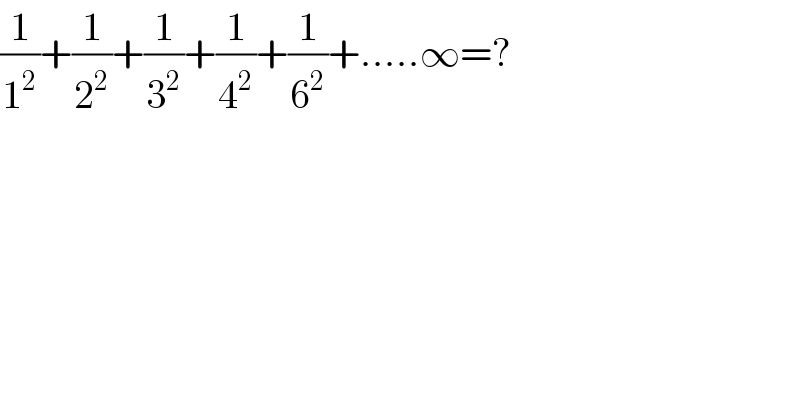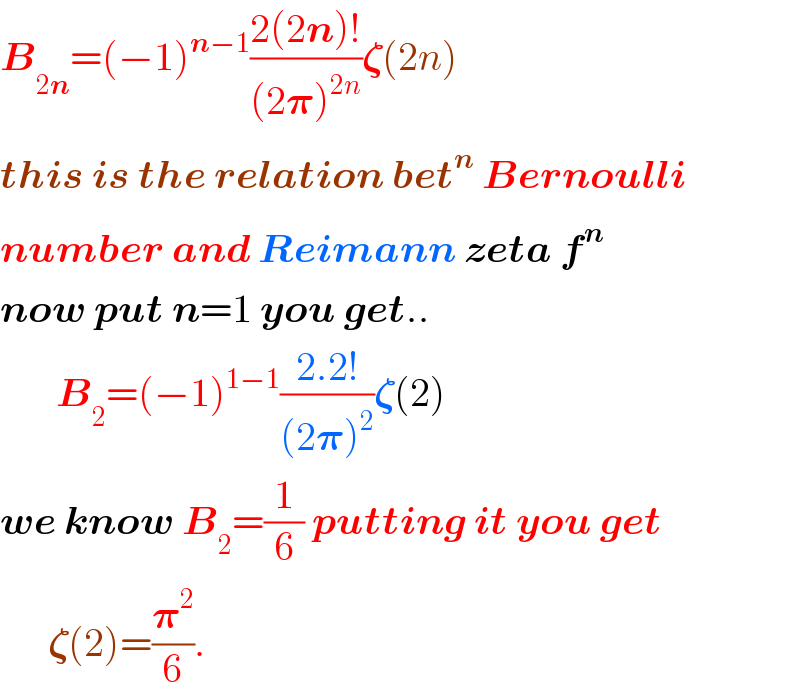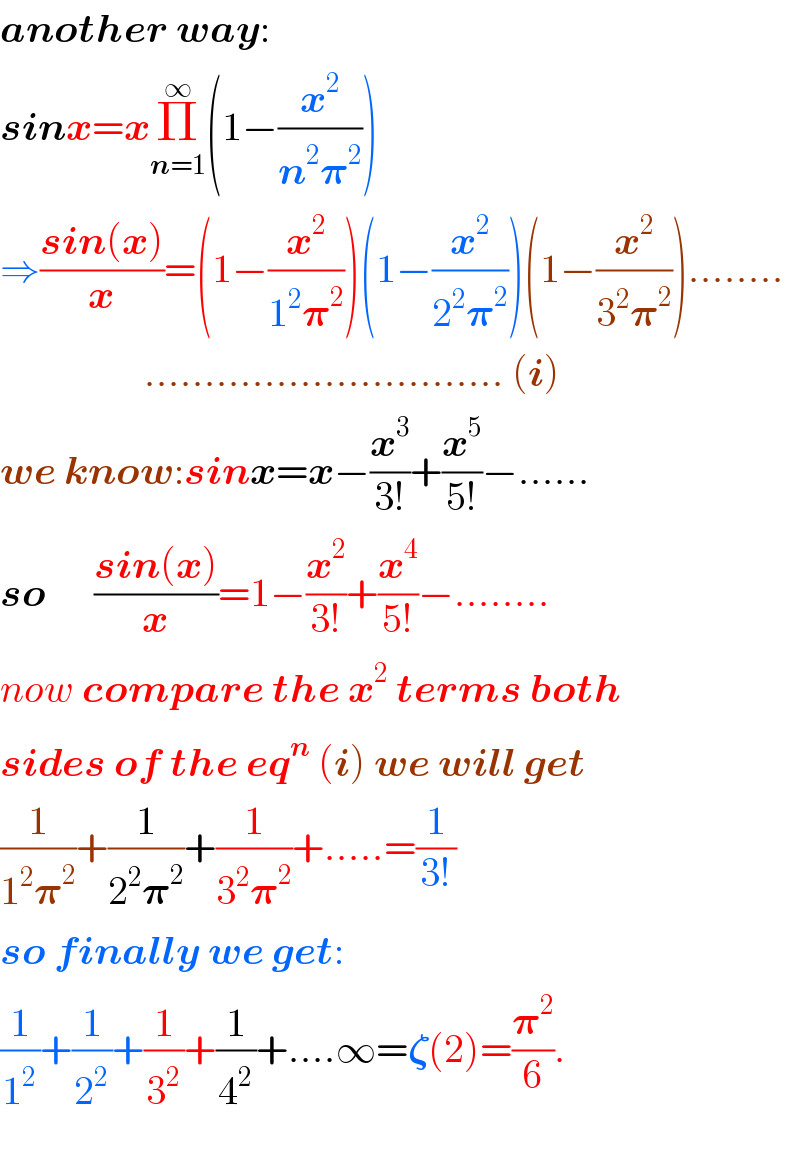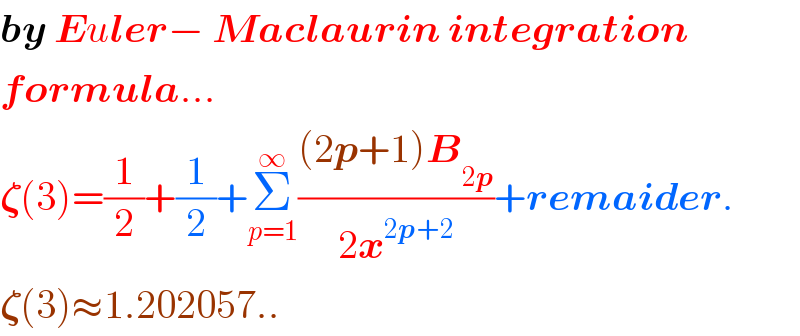
Question Number 99853 by Dwaipayan Shikari last updated on 23/Jun/20

$$\frac{\mathrm{1}}{\mathrm{1}^{\mathrm{2}} }+\frac{\mathrm{1}}{\mathrm{2}^{\mathrm{2}} }+\frac{\mathrm{1}}{\mathrm{3}^{\mathrm{2}} }+\frac{\mathrm{1}}{\mathrm{4}^{\mathrm{2}} }+\frac{\mathrm{1}}{\mathrm{6}^{\mathrm{2}} }+.....\infty=? \\ $$
Answered by smridha last updated on 23/Jun/20

$$\underset{\boldsymbol{{n}}=\mathrm{1}} {\overset{\infty} {\sum}}{n}^{−\mathrm{2}} =\boldsymbol{\zeta}\left(\mathrm{2}\right)=\frac{\boldsymbol{\pi}^{\mathrm{2}} }{\mathrm{6}} \\ $$
Commented by Dwaipayan Shikari last updated on 23/Jun/20

$${Thanks}\:{for}\:{giving}\:\:{the}\:{answer}.\:{Can}\:{you}\:{describe}\:{it}.\:{As}\:{i}\:{am}\:{a}\:{student}\:\:{i}\:{want}\:{to}\:{learn}\:{it}. \\ $$
Commented by abdomathmax last updated on 23/Jun/20

$$\mathrm{can}\:\mathrm{you}\:\mathrm{show}\:\mathrm{a}\:\mathrm{way}\:\mathrm{for}\:\mathrm{this}\:\mathrm{mr}\:\mathrm{mridha}... \\ $$
Commented by smridha last updated on 23/Jun/20

$$\boldsymbol{{okkk}}\:\boldsymbol{{i}}\:\boldsymbol{{can}} \\ $$
Commented by smridha last updated on 23/Jun/20

$$\boldsymbol{{B}}_{\mathrm{2}\boldsymbol{{n}}} =\left(−\mathrm{1}\right)^{\boldsymbol{{n}}−\mathrm{1}} \frac{\mathrm{2}\left(\mathrm{2}\boldsymbol{{n}}\right)!}{\left(\mathrm{2}\boldsymbol{\pi}\right)^{\mathrm{2}{n}} }\boldsymbol{\zeta}\left(\mathrm{2}{n}\right) \\ $$$$\boldsymbol{{this}}\:\boldsymbol{{is}}\:\boldsymbol{{the}}\:\boldsymbol{{relation}}\:\boldsymbol{{bet}}^{\boldsymbol{{n}}} \:\boldsymbol{{Bernoulli}} \\ $$$$\boldsymbol{{number}}\:\boldsymbol{{and}}\:\boldsymbol{{Reimann}}\:\boldsymbol{{zeta}}\:\boldsymbol{{f}}^{\boldsymbol{{n}}} \\ $$$$\boldsymbol{{now}}\:\boldsymbol{{put}}\:\boldsymbol{{n}}=\mathrm{1}\:\boldsymbol{{you}}\:\boldsymbol{{get}}.. \\ $$$$\:\:\:\:\:\:\:\boldsymbol{{B}}_{\mathrm{2}} =\left(−\mathrm{1}\right)^{\mathrm{1}−\mathrm{1}} \frac{\mathrm{2}.\mathrm{2}!}{\left(\mathrm{2}\boldsymbol{\pi}\right)^{\mathrm{2}} }\boldsymbol{\zeta}\left(\mathrm{2}\right) \\ $$$$\boldsymbol{{we}}\:\boldsymbol{{know}}\:\boldsymbol{{B}}_{\mathrm{2}} =\frac{\mathrm{1}}{\mathrm{6}}\:\boldsymbol{{putting}}\:\boldsymbol{{it}}\:\boldsymbol{{you}}\:\boldsymbol{{get}} \\ $$$$\:\:\:\:\:\:\boldsymbol{\zeta}\left(\mathrm{2}\right)=\frac{\boldsymbol{\pi}^{\mathrm{2}} }{\mathrm{6}}. \\ $$
Commented by smridha last updated on 23/Jun/20

$$\boldsymbol{{another}}\:\boldsymbol{{way}}: \\ $$$$\boldsymbol{{sinx}}=\boldsymbol{{x}}\underset{\boldsymbol{{n}}=\mathrm{1}} {\overset{\infty} {\prod}}\left(\mathrm{1}−\frac{\boldsymbol{{x}}^{\mathrm{2}} }{\boldsymbol{{n}}^{\mathrm{2}} \boldsymbol{\pi}^{\mathrm{2}} }\right) \\ $$$$\Rightarrow\frac{\boldsymbol{{sin}}\left(\boldsymbol{{x}}\right)}{\boldsymbol{{x}}}=\left(\mathrm{1}−\frac{\boldsymbol{{x}}^{\mathrm{2}} }{\mathrm{1}^{\mathrm{2}} \boldsymbol{\pi}^{\mathrm{2}} }\right)\left(\mathrm{1}−\frac{\boldsymbol{{x}}^{\mathrm{2}} }{\mathrm{2}^{\mathrm{2}} \boldsymbol{\pi}^{\mathrm{2}} }\right)\left(\mathrm{1}−\frac{\boldsymbol{{x}}^{\mathrm{2}} }{\mathrm{3}^{\mathrm{2}} \boldsymbol{\pi}^{\mathrm{2}} }\right)........ \\ $$$$\:\:\:\:\:\:\:\:\:\:\:\:\:\:\:\:\:\:..............................\:\left(\boldsymbol{{i}}\right) \\ $$$$\boldsymbol{{we}}\:\boldsymbol{{know}}:\boldsymbol{{sinx}}=\boldsymbol{{x}}−\frac{\boldsymbol{{x}}^{\mathrm{3}} }{\mathrm{3}!}+\frac{\boldsymbol{{x}}^{\mathrm{5}} }{\mathrm{5}!}−...... \\ $$$$\boldsymbol{{so}}\:\:\:\:\:\:\frac{\boldsymbol{{sin}}\left(\boldsymbol{{x}}\right)}{\boldsymbol{{x}}}=\mathrm{1}−\frac{\boldsymbol{{x}}^{\mathrm{2}} }{\mathrm{3}!}+\frac{\boldsymbol{{x}}^{\mathrm{4}} }{\mathrm{5}!}−........ \\ $$$${now}\:\boldsymbol{{compare}}\:\boldsymbol{{the}}\:\boldsymbol{{x}}^{\mathrm{2}} \:\boldsymbol{{terms}}\:\boldsymbol{{both}} \\ $$$$\boldsymbol{{sides}}\:\boldsymbol{{of}}\:\boldsymbol{{the}}\:\boldsymbol{{eq}}^{\boldsymbol{{n}}} \:\left(\boldsymbol{{i}}\right)\:\boldsymbol{{we}}\:\boldsymbol{{will}}\:\boldsymbol{{get}} \\ $$$$\frac{\mathrm{1}}{\mathrm{1}^{\mathrm{2}} \boldsymbol{\pi}^{\mathrm{2}} }+\frac{\mathrm{1}}{\mathrm{2}^{\mathrm{2}} \boldsymbol{\pi}^{\mathrm{2}} }+\frac{\mathrm{1}}{\mathrm{3}^{\mathrm{2}} \boldsymbol{\pi}^{\mathrm{2}} }+.....=\frac{\mathrm{1}}{\mathrm{3}!} \\ $$$$\boldsymbol{{so}}\:\boldsymbol{{finally}}\:\boldsymbol{{we}}\:\boldsymbol{{get}}: \\ $$$$\frac{\mathrm{1}}{\mathrm{1}^{\mathrm{2}} }+\frac{\mathrm{1}}{\mathrm{2}^{\mathrm{2}} }+\frac{\mathrm{1}}{\mathrm{3}^{\mathrm{2}} }+\frac{\mathrm{1}}{\mathrm{4}^{\mathrm{2}} }+....\infty=\boldsymbol{\zeta}\left(\mathrm{2}\right)=\frac{\boldsymbol{\pi}^{\mathrm{2}} }{\mathrm{6}}. \\ $$$$ \\ $$
Commented by I want to learn more last updated on 23/Jun/20

$$\mathrm{sir}\:\mathrm{what}\:\mathrm{of}\:\:\zeta\left(\mathrm{3}\right)\:\:??? \\ $$
Commented by abdomathmax last updated on 23/Jun/20

$$\xi\left(\mathrm{3}\right)\:=\sum_{\mathrm{n}=\mathrm{1}} ^{\infty} \:\frac{\mathrm{1}}{\mathrm{n}^{\mathrm{3}} }\:=\mathrm{1}+\frac{\mathrm{1}}{\mathrm{8}}\:+\frac{\mathrm{1}}{\mathrm{27}}+.... \\ $$$$\xi\left(\mathrm{3}\right)\:\sim\mathrm{1},\mathrm{2} \\ $$
Commented by I want to learn more last updated on 23/Jun/20

$$\mathrm{Sir},\:\mathrm{please}\:\mathrm{full}\:\mathrm{workings}. \\ $$
Commented by smridha last updated on 23/Jun/20

$$\boldsymbol{{by}}\:\boldsymbol{{E}}{u}\boldsymbol{{ler}}−\:\boldsymbol{{Maclaurin}}\:\boldsymbol{{integration}} \\ $$$$\boldsymbol{{formula}}... \\ $$$$\boldsymbol{\zeta}\left(\mathrm{3}\right)=\frac{\mathrm{1}}{\mathrm{2}}+\frac{\mathrm{1}}{\mathrm{2}}+\underset{{p}=\mathrm{1}} {\overset{\infty} {\sum}}\frac{\left(\mathrm{2}\boldsymbol{{p}}+\mathrm{1}\right)\boldsymbol{{B}}_{\mathrm{2}\boldsymbol{{p}}} }{\mathrm{2}\boldsymbol{{x}}^{\mathrm{2}\boldsymbol{{p}}+\mathrm{2}} }+\boldsymbol{{remaider}}. \\ $$$$\boldsymbol{\zeta}\left(\mathrm{3}\right)\approx\mathrm{1}.\mathrm{202057}.. \\ $$
Commented by mathmax by abdo last updated on 23/Jun/20

$$\mathrm{i}\:\mathrm{think}\:\mathrm{no}\:\mathrm{elementary}\:\mathrm{function}\:\mathrm{to}\:\mathrm{calculate}\:\mathrm{the}\:\mathrm{exact}\:\mathrm{value}\: \\ $$
Commented by smridha last updated on 24/Jun/20

$$\boldsymbol{{therefore}}\:\boldsymbol{{I}}\:\boldsymbol{{used}}\:\approx\:{in}\boldsymbol{{stead}}\:\boldsymbol{{of}} \\ $$$$=. \\ $$$$ \\ $$
Answered by abdomathmax last updated on 23/Jun/20
![let f(x)=1 2π periodic odd let developp f at fourier serie f(x) =Σ_(n=1) ^∞ a_n sin(nx) a_n =(2/T)∫_([T]) sin(nx)dx =(1/π)∫_(−π) ^π sin(nx)dx =(2/π) ∫_0 ^π sin(nx)dx =−(2/π)[(1/n)cos(nx)]_0 ^π =−(2/(nπ)){ (−1)^n −1) ⇒ f(x) =Σ_(n=1) ^(∞ ) (2/(nπ))(1−(−1)^n )sin(nx) =(2/π) Σ_(n=0) ^∞ (2/(2n+1))sin(2n+1)x =1 ⇒ (4/π) Σ_(n=0) ^∞ ((sin(2n+1)x)/((2n+1))) =1 ⇒ Σ_(n=0) ^∞ ((sin(2n+1)x)/(2n+1)) =(π/4) let integrate ⇒ −Σ_(n=0) ^∞ ((cos(2n+1)x)/((2n+1)^2 )) =((πx)/4) +c x=0 ⇒−Σ_(n=0) ^∞ (1/((2n+1)^2 )) =c ⇒ ((πx)/4) =−Σ_(n=0) ^∞ ((cos(2n+1)x)/((2n+1)^2 ))+Σ_(n=0) ^∞ (1/((2n+1)^2 )) x=π ⇒(π^2 /4) =Σ_(n=0) ^∞ (1/((2n+1)^2 )) +Σ_(n=0) ^∞ (1/((2n+1)^2 )) ⇒ Σ_(n=0) ^∞ (1/((2n+1)^2 )) =(π^2 /8) we have Σ_(n=1) ^∞ (1/n^2 ) =(1/4)Σ_(n=1) ^∞ (1/n^2 ) +Σ_(n=0) ^∞ (1/((2n+1)^2 )) ⇒(3/4)Σ_(n=1) ^∞ (1/n^2 ) =(π^2 /8) ⇒ Σ_(n=1) ^∞ (1/n^2 ) =(4/3)×(π^2 /8) Σ_(n=1) ^∞ (1/n^2 ) =(π^2 /6)](Q99878.png)
$$\mathrm{let}\:\mathrm{f}\left(\mathrm{x}\right)=\mathrm{1}\:\:\mathrm{2}\pi\:\mathrm{periodic}\:\mathrm{odd}\:\mathrm{let}\:\mathrm{developp}\:\mathrm{f}\:\mathrm{at}\: \\ $$$$\mathrm{fourier}\:\mathrm{serie}\:\mathrm{f}\left(\mathrm{x}\right)\:=\sum_{\mathrm{n}=\mathrm{1}} ^{\infty} \:\mathrm{a}_{\mathrm{n}} \mathrm{sin}\left(\mathrm{nx}\right) \\ $$$$\mathrm{a}_{\mathrm{n}} =\frac{\mathrm{2}}{\mathrm{T}}\int_{\left[\mathrm{T}\right]} \:\mathrm{sin}\left(\mathrm{nx}\right)\mathrm{dx}\:=\frac{\mathrm{1}}{\pi}\int_{−\pi} ^{\pi} \:\mathrm{sin}\left(\mathrm{nx}\right)\mathrm{dx} \\ $$$$=\frac{\mathrm{2}}{\pi}\:\int_{\mathrm{0}} ^{\pi} \:\mathrm{sin}\left(\mathrm{nx}\right)\mathrm{dx}\:\:=−\frac{\mathrm{2}}{\pi}\left[\frac{\mathrm{1}}{\mathrm{n}}\mathrm{cos}\left(\mathrm{nx}\right)\right]_{\mathrm{0}} ^{\pi} \\ $$$$=−\frac{\mathrm{2}}{\mathrm{n}\pi}\left\{\:\left(−\mathrm{1}\right)^{\mathrm{n}} −\mathrm{1}\right)\:\Rightarrow \\ $$$$\mathrm{f}\left(\mathrm{x}\right)\:=\sum_{\mathrm{n}=\mathrm{1}} ^{\infty\:} \:\frac{\mathrm{2}}{\mathrm{n}\pi}\left(\mathrm{1}−\left(−\mathrm{1}\right)^{\mathrm{n}} \right)\mathrm{sin}\left(\mathrm{nx}\right) \\ $$$$=\frac{\mathrm{2}}{\pi}\:\sum_{\mathrm{n}=\mathrm{0}} ^{\infty} \:\frac{\mathrm{2}}{\mathrm{2n}+\mathrm{1}}\mathrm{sin}\left(\mathrm{2n}+\mathrm{1}\right)\mathrm{x}\:=\mathrm{1}\:\Rightarrow \\ $$$$\frac{\mathrm{4}}{\pi}\:\sum_{\mathrm{n}=\mathrm{0}} ^{\infty} \:\frac{\mathrm{sin}\left(\mathrm{2n}+\mathrm{1}\right)\mathrm{x}}{\left(\mathrm{2n}+\mathrm{1}\right)}\:=\mathrm{1}\:\Rightarrow \\ $$$$\sum_{\mathrm{n}=\mathrm{0}} ^{\infty} \:\frac{\mathrm{sin}\left(\mathrm{2n}+\mathrm{1}\right)\mathrm{x}}{\mathrm{2n}+\mathrm{1}}\:=\frac{\pi}{\mathrm{4}}\:\:\mathrm{let}\:\mathrm{integrate}\:\Rightarrow \\ $$$$−\sum_{\mathrm{n}=\mathrm{0}} ^{\infty} \:\frac{\mathrm{cos}\left(\mathrm{2n}+\mathrm{1}\right)\mathrm{x}}{\left(\mathrm{2n}+\mathrm{1}\right)^{\mathrm{2}} }\:=\frac{\pi\mathrm{x}}{\mathrm{4}}\:+\mathrm{c} \\ $$$$\mathrm{x}=\mathrm{0}\:\Rightarrow−\sum_{\mathrm{n}=\mathrm{0}} ^{\infty} \:\frac{\mathrm{1}}{\left(\mathrm{2n}+\mathrm{1}\right)^{\mathrm{2}} }\:=\mathrm{c}\:\Rightarrow \\ $$$$\frac{\pi\mathrm{x}}{\mathrm{4}}\:=−\sum_{\mathrm{n}=\mathrm{0}} ^{\infty} \:\frac{\mathrm{cos}\left(\mathrm{2n}+\mathrm{1}\right)\mathrm{x}}{\left(\mathrm{2n}+\mathrm{1}\right)^{\mathrm{2}} }+\sum_{\mathrm{n}=\mathrm{0}} ^{\infty} \:\frac{\mathrm{1}}{\left(\mathrm{2n}+\mathrm{1}\right)^{\mathrm{2}} } \\ $$$$\mathrm{x}=\pi\:\Rightarrow\frac{\pi^{\mathrm{2}} }{\mathrm{4}}\:=\sum_{\mathrm{n}=\mathrm{0}} ^{\infty} \:\frac{\mathrm{1}}{\left(\mathrm{2n}+\mathrm{1}\right)^{\mathrm{2}} }\:+\sum_{\mathrm{n}=\mathrm{0}} ^{\infty} \:\frac{\mathrm{1}}{\left(\mathrm{2n}+\mathrm{1}\right)^{\mathrm{2}} }\:\Rightarrow \\ $$$$\sum_{\mathrm{n}=\mathrm{0}} ^{\infty} \:\frac{\mathrm{1}}{\left(\mathrm{2n}+\mathrm{1}\right)^{\mathrm{2}} }\:=\frac{\pi^{\mathrm{2}} }{\mathrm{8}} \\ $$$$\mathrm{we}\:\mathrm{have}\:\sum_{\mathrm{n}=\mathrm{1}} ^{\infty} \:\frac{\mathrm{1}}{\mathrm{n}^{\mathrm{2}} }\:=\frac{\mathrm{1}}{\mathrm{4}}\sum_{\mathrm{n}=\mathrm{1}} ^{\infty} \:\frac{\mathrm{1}}{\mathrm{n}^{\mathrm{2}} }\:+\sum_{\mathrm{n}=\mathrm{0}} ^{\infty} \:\frac{\mathrm{1}}{\left(\mathrm{2n}+\mathrm{1}\right)^{\mathrm{2}} } \\ $$$$\Rightarrow\frac{\mathrm{3}}{\mathrm{4}}\sum_{\mathrm{n}=\mathrm{1}} ^{\infty} \:\frac{\mathrm{1}}{\mathrm{n}^{\mathrm{2}} }\:=\frac{\pi^{\mathrm{2}} }{\mathrm{8}}\:\Rightarrow\:\sum_{\mathrm{n}=\mathrm{1}} ^{\infty} \:\frac{\mathrm{1}}{\mathrm{n}^{\mathrm{2}} }\:=\frac{\mathrm{4}}{\mathrm{3}}×\frac{\pi^{\mathrm{2}} }{\mathrm{8}} \\ $$$$\sum_{\mathrm{n}=\mathrm{1}} ^{\infty} \:\frac{\mathrm{1}}{\mathrm{n}^{\mathrm{2}} }\:=\frac{\pi^{\mathrm{2}} }{\mathrm{6}} \\ $$
